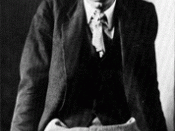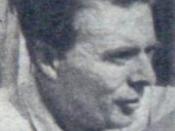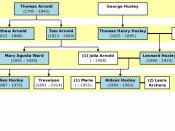Criticism of Practical Application of Utopia in Brave New World Aldous Huxley's Brave New World illustrates the loss of morality when established standards are replaced by amoral criteria. In his novel, Huxley criticizes the practical applications of Utopia in actual society. Huxley's depiction of love, science, and religion support the ineffectiveness of implementing Utopia in everyday life.
In Brave New World, Huxley shows contempt for the human emotion of love. The people that make up his imaginary society have no conception of love or any other passion, and actually scorn the idea. Huxley believes that along with passion comes emotional instability. The Utopian state cannot afford any kind of instability and therefore cannot afford love.
The destruction of the family is one example of the effect of Utopia's absence of love. In a world of bottled-births, not only is there no need for a family, but the idea is actually considered obscene.
The terms 'mother' and 'father' are extremely offensive and are rarely used except in science.
Huxley uses Mustapha Mond, the World Controller, to portray the vulgarity when he explains the obscenity of life before Utopia to a group of students:
And home was as squalid psychically as physically. Psychically, it was a rabbit hole, a midden, hot with the frictions of tightly packed life, reeking with emotion. What suffocating intimacies, what dangerous, insane, obscene relationships between the members of the family group! (37)
In an earlier passage, Huxley shows the effects of Mond's explanation on one boy, 'The Controller's evocation was so vivid that one of the boys . . . turned pale at the mere description and was on the point of being sick' (36).
In reality, the family unit is the core of society. Huxley realizes the importance of the home and family. A home is...


